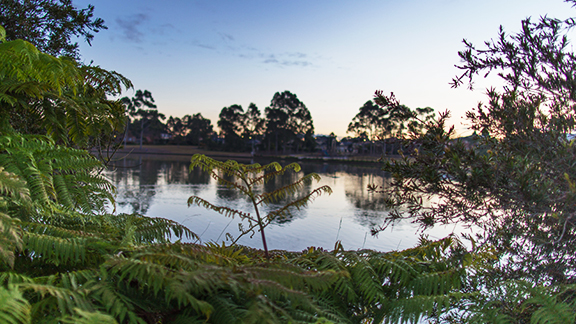In July 2007 Liverpool City Council received approval for a permanent environment levy called the Environment Restoration Plan. This new levy aims to continue programs implemented by the previous environment levy as well as develop further environmental initiatives to be delivered in the Liverpool LGA.
Click here to download a copy of the Environment Restoration Plan.
The new levy aims to continue programs implemented by the previous environment levy as well as develop further environmental initiatives to be delivered in the Liverpool LGA.
The Environment Restoration Plan provides a framework for the delivery of key environmental projects for the long term benefit of Liverpool and its community. The Environment Restoration Plan is an outline of the environmental projects, programs, and on-ground works to help improve the natural environment of Liverpool by:
- Protecting and restoring Liverpool's local endangered ecological communities and other bushland (bush regeneration)
- Building community networks and partnerships.
- Delivering environmental education to the Liverpool community.
- Supporting environmental projects across Liverpool.
- Installing fencing and access paths for environment protection.
- Improving the city image.
A minimum of eight (8) bush regeneration projects will be carried out each year. Environmental Restoration works are already in progress at many locations around Liverpool. The Environment Restoration Plan includes a committee which was established to work closely with council to address key environmental issues.
Call the Council's Environment Restoration Plan Coordinator on 8711 7391 for additional information.
Using the Council's site selection process, the following sites were chosen for bush regeneration works in 2016/2017:
- Glen Regent Reserve, Tom Way, Casula
- Peter Miller Park, Cedar Road, Casula
- River Walk, Boronia Drive, Voyager Point
- Voyager Point Bushland, Sirius Road, Voyager Point
- Mannix Park, Sadleir Ave, Heckenberg
- Tepper Park, Stanwell Crescent, Ashcroft
- Bill Anderson Park, Elizabeth Drive, Kemps Creek
- Pye Hill Reserve, Leopold Place, Cecil Hills
- Blamfield Oval, Stanwell Crescent, Ashcroft
- Lehmanns Oval (Elouera Nature Reserve), McLean Street, Liverpool
- Brickmakers Creek, Lawrence Hargrave Road, Warwick Farm
- Dwyer Oval, Williamson Crescent, Warwick Farm
- Lake Moore, Whelan Avenue, Chipping Norton
- Lot 10 Heathcote Road, Holsworthy
- Clinches Pond, Swain Street, Moorebank
The Environment Restoration Plan is funded by an ad valorem charge per rateable property. This charge is a percentage of the individual value, which makes it fair as it relates to property values. The environment levy is approximately $20.00 per annum for a 650m² block of land.
The Council has employed qualified bush regenerators to maintain all works completed under the Environment Restoration Plan. They maintain contracted bush regeneration works that have been completed, tree planting activities, and assist in supporting Environment Group site works.
Council bush regenerators will also ensure that work sites are maintained until they are able to function once again as natural ecosystems.
Liverpool has many kilometres of waterways, patches of bushland and endangered ecological communities (EEC's). Liverpool however is currently one of the most rapidly growing cities in NSW, and therefore the natural environment is exposed to pressures from development and urban sprawl. Littering, rubbish dumping, weed invasion, erosion, and increased nutrients also threaten our native animals, bushland, and waterways. It is essential that Council and the community implement projects and programs to conserve and maintain Liverpool's environment.
The Environment Restoration Plan provides many opportunities for you to become involved in environmental activities around Liverpool. You can contribute by:
- Planting trees in your garden and in the community. Council's monthly community tree planting events enhance public reserves and bushland areas.
- Attending one of Council's sustainability workshops.
- Putting lawn clippings and garden waste into your green bin. Plants can escape from your garden and become environmental weeds.
- Join one of our many environmental groups in your local area to remove weeds, plant local native plants, remove litter and test for water quality.
For more information about the Environment Restoration Plan or how you can get involved call Council's Environment Restoration Plan Coordinator on 8711 7391 or email erp@liverpool.nsw.gov.au
- Learn more about Council's Environmental Volunteering Programs.
- Complete the Environmental Volunteering form to express your interest in joining an environment group.
The role of the Environment Advisory Committee is to consider environmental issues facing the Liverpool area. Each member is responsible for providing input on the development of environmental programs including implementation of Council's Environment Restoration Plan, working in partnership with Council to deliver various environmental initiatives and community participation in Council's environmental programs.
The objectives of the committee are to:
- Consider key environmental issues facing Liverpool and make recommendations to Council
- Consider key floodplain and water management issues facing Liverpool and make recommendations to Council
- Provide input to Council with respect to the development of environmental and floodplain management programs for Liverpool
- Work in partnership with Council in terms of various environmental and floodplain management initiatives
- Provide input to the implementation of Council's Environment Restoration Plan
Provide input to the development of future programs as part of the ongoing implementation of the Environment Restoration Plan - Provide opportunities for meaningful community participation.
The Environment Advisory Committee consists of 18 members including Council staff and representatives from various backgrounds including the following:
- Community members
- Councillors
- Aboriginal Land Councils
- Industry representatives
- Local Land Services
- Council Staff
For access to EAC reports, contact Council's ERP Coordinator on 8711 7391.


